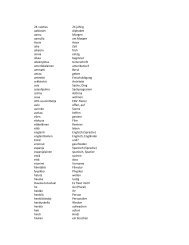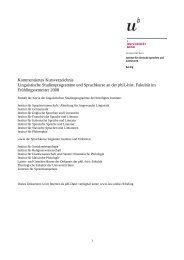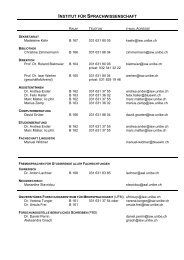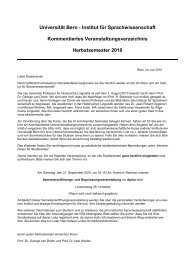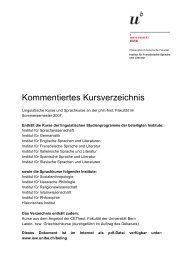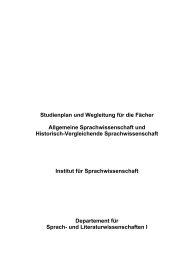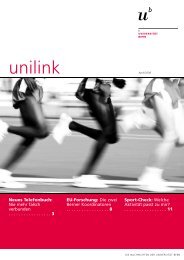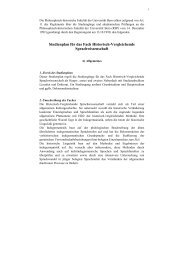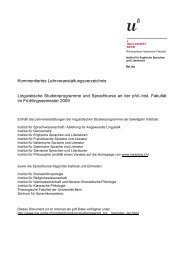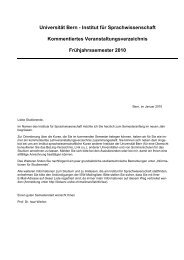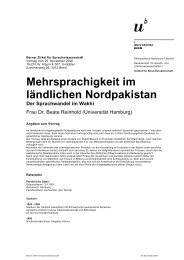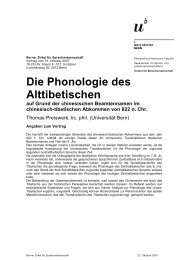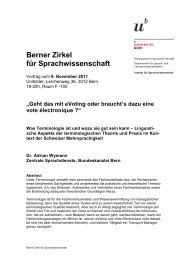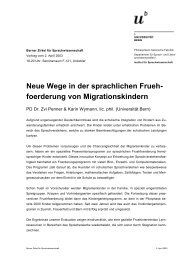The expression of modality in Korean - Institut für ...
The expression of modality in Korean - Institut für ...
The expression of modality in Korean - Institut für ...
Create successful ePaper yourself
Turn your PDF publications into a flip-book with our unique Google optimized e-Paper software.
4<br />
<strong>modality</strong> 3 . This is also the basic foundation <strong>of</strong> the framework <strong>of</strong> this study, namely a model <strong>of</strong><br />
<strong>modality</strong> which is based on semantic-pragmatic parameters, i.e. which is def<strong>in</strong>ed by semantic<br />
concepts and discourse-pragmatic pr<strong>in</strong>ciples. I shall refer to this type <strong>of</strong> model <strong>of</strong> <strong>modality</strong> as<br />
„notional“, mean<strong>in</strong>g that it stems from one pr<strong>in</strong>cipal concept (i.e. the <strong>expression</strong> <strong>of</strong> the<br />
speaker’s attitude) under which particular elements are classed. A notional model <strong>of</strong> <strong>modality</strong><br />
serves to provide a conceptual basis which is a broad def<strong>in</strong>ition <strong>of</strong> a cross-l<strong>in</strong>guistic, category<br />
MODALITY 4 , which may have different formal manifestations <strong>in</strong> different natural languages,<br />
rang<strong>in</strong>g from lexical to highly grammaticalized means <strong>of</strong> encod<strong>in</strong>g, with the various types <strong>of</strong><br />
<strong>modality</strong> themselves assumed to be universal. A notional model therefore is not and does not<br />
strive to be a complete and thorough pre-empirical theory <strong>of</strong> <strong>modality</strong>. But can such a<br />
relatively broad model be adequate? I contend that it certa<strong>in</strong>ly is adequate for the purpose it is<br />
formulated for, to provide a systematic set <strong>of</strong> descriptive and analytical tools for a study <strong>of</strong><br />
<strong>modality</strong> on a morpho-syntactic level. Furthermore, although such a model <strong>of</strong> <strong>modality</strong> is<br />
obviously much less restra<strong>in</strong>ed and bound than a non-empirical, <strong>in</strong>ductive model, it is by no<br />
means completely open (which would render it useless). As I will show <strong>in</strong> the next<br />
subchapter, a notional model <strong>of</strong> <strong>modality</strong> is governed by a set <strong>of</strong> strict rules and pr<strong>in</strong>ciples. In<br />
addition, consider the follow<strong>in</strong>g comments by Nølke (1989):<br />
„In a recent article, the logician Gardies 5 has paid special attention to the problem<br />
<strong>of</strong> def<strong>in</strong><strong>in</strong>g the l<strong>in</strong>guistic category <strong>of</strong> <strong>modality</strong>. His conclusion is rather<br />
discourag<strong>in</strong>g. He shows that neither the narrow Aristotelian def<strong>in</strong>ition nor the<br />
broad speaker oriented one which def<strong>in</strong>es <strong>modality</strong> as „any modification <strong>of</strong> a<br />
propositional content“, makes possible a rigorous demarcation <strong>of</strong> the l<strong>in</strong>guistic<br />
facts normally referred to as <strong>in</strong>stances <strong>of</strong> <strong>modality</strong> (...) what he is say<strong>in</strong>g is that no<br />
equivalence can be established between this (supposed) factual extension <strong>of</strong><br />
<strong>modality</strong> and the extension generated by any exist<strong>in</strong>g theory.“ (Nølke 1989, 47)<br />
If this statement comes anywhere close to the scientific status quo <strong>of</strong> research on <strong>modality</strong><br />
(and I believe it does), it is clear that no theory has def<strong>in</strong>itive descriptive, analytical and<br />
explanative strength, and - repeat<strong>in</strong>g what I have already stated above - it is virtually<br />
impossible that the phenomenon <strong>of</strong> <strong>modality</strong> will ever come to be with<strong>in</strong> reach <strong>of</strong> such a<br />
comprehensive theory, due to all the factors and reasons already expla<strong>in</strong>ed and discussed. It is<br />
therefore methodologically sound to choose an approach which best befits the goal and scope<br />
3 Although Lyons’s basic def<strong>in</strong>ition <strong>of</strong> <strong>modality</strong> must be the word<strong>in</strong>g which is quoted most <strong>of</strong>ten, the concept<br />
itself is by no means his <strong>in</strong>vention. Jespersen (1924, 313) e.g. considered moods to „express certa<strong>in</strong> attitudes <strong>of</strong><br />
the m<strong>in</strong>d <strong>of</strong> the speaker towards the contents <strong>of</strong> the sentence.“<br />
4 <strong>The</strong> uppercase denom<strong>in</strong>ation convention is adopted from Dahl’s (1985) practice, signall<strong>in</strong>g a universal category.<br />
5 Gardies, J.L. (1983) Tentative d’une déf<strong>in</strong>ition de la modalité. In: La notion sémanticologique de modalité, J.<br />
David & G. Kleiber (eds.), 13-24. Kliencksieck, Paris.



